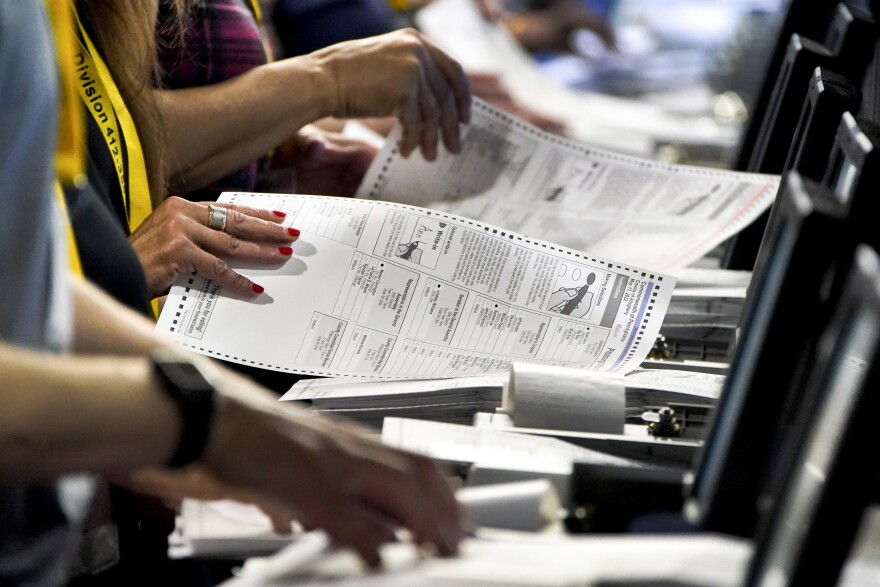Republicans in the North Carolina General Assembly want to make confidential voting records more easily accessible to the public, something 2020 election deniers have been pushing for ever since Donald Trump launched his effort to snatch victory from his defeat to President Joe Biden.
A bill going through the House Committee on Elections and Campaign Finance Reform this week would require elections officials to turn over cast vote records, or CVRs, and completed ballots in response to public records requests.
Under current state law, those records are deemed confidential and available only by court order.
"We need all the requests for the Cast Vote Records in every single county across the United States," My Pillow Guy Mike Lindell exhorted his followers during a so-called "Moment of Truth Summit" last year in Springfield, MO. "That's your biggest call to action.
The livestreamed event, caught on video and stored on Lindell’s website, frankspeech.com, conveniently provided a promo code that could be used to buy Lindell's pillows and other products.
Fellow conspiracy theorists have heeded Lindell's call. Since 2020, elections officials in North Carolina and in other states have been inundated by records requests demanding access to CVRs.
Push for public access to voting records tied to 2020 election deniers
Supporters of the Republican-backed bill in committee at the state legislature this week argue it would improve transparency of elections administration. The measure follows model legislation provided by a group tied to Cleta Mitchell, a Trump ally and participant in the former president's bid to overturn the 2020 results in Georgia.
That model legislation is posted on the North Carolina Election Integrity Team's web site. NCEIT is a chapter of Mitchell's Election Integrity Network.
"It opens up the opportunity to assure the public that the machines are not corrupted, or the machines are not flipping votes," Jim Womack, a former Lee County commissioner and president of NCEIT, said of the legislative effort to make CVRs available by public records request.
Current state law states "no person other than elections officials performing their duties may have access to voted ballots or paper or electronic records of individual voted ballots except by court order or order of the appropriate board of elections as part of the resolution of an election protest or investigation of an alleged election irregularity or violation."
The proposed legislation does require elections officials to redact any identifying information about an individual voter before releasing such documents. However, because CVRs are chronological records of how a person voted, the data could be used to extrapolate how a particular individual voted, especially in a small county with relatively few people at a precinct on any given day and where people know one another, according to some elections administrators.
Through its legal counsel, the State Board of Elections has recommended lawmakers add the following language to the bill: "In releasing these documents, election officials shall not compromise the secrecy of an individual’s ballot."
In an interview with WUNC, NCEIT President Jim Womack argued that allowing greater public access to CVRs would dispel the very mistrust in elections administration sowed by Mike Lindell and other conspiracy theorists of that ilk.
State elections board concerned counties could resort entirely to hand-counting ballots
The state elections board's legal department also has recommended legislators remove another section of the bill entirely, one that would seemingly enable counties to circumvent the board's authority to approve any alterations to North Carolina's voting system by dispensing with vote tabulators and relying solely on hand-counting ballots.
In a statement sent to the North Carolina House Committee on Elections and Campaign Finance Reform, which is taking up the bill this week, the board said it's concerned that lawmakers are subscribing to a misguided belief that hand counting ballots would boost election integrity.
"There has been a recent movement among certain activists to have volunteers hand-count ballots rather than rely on federal and state-certified voting tabulators to ascertain election results," the letter said. "This has resulted in individual counties in some states seeking to hand count their ballots, against the wishes of the state’s election administration."
The letter went on to say that doing so is "widely opposed by experts in election administration" except in very small jurisdictions where hand-counting wouldn't be cost prohibitive or prone to error.
Last week, California's Democrat-dominated state legislature passed a law that would require vote counting machines and ban hand counting in elections across most of the state. The law was passed in response to an effort by right-wing elections officials in one county that wanted to mandate the use of hand counts.
This bill is just one of three major elections bills being pushed through the North Carolina General Assembly by the Republican super-majority this week.
GOP lawmakers are expected to override Democratic Gov. Roy Cooper's veto of a bill that would eliminate a three-day grace period for counting mail-in ballots postmarked by Election Day.
And another bill in committee would reshape the state elections board and give lawmakers greater power over voting administration.
Editor's Note: This story has been corrected to reflect that North Carolina Election Integrity Team President Jim Womack named only Mike Lindell as the type of conspiracy theorist that greater public access to CVRs would refute. NCEIT is a chapter of the Election Integrity Network that was founded by Cleta Mitchell, who is known for her role in trying to help Donald Trump overturn Georgia's 2020 presidential election results. Womack later described Mitchell to WUNC as "the most fact-based personality in this space I have come in contact with.”



